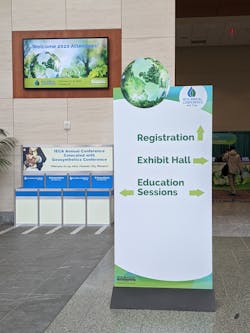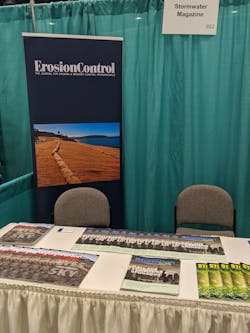At the end of February, I had the opportunity to attend the International Erosion Control Association (IECA) Annual Conference and Expo in Raleigh, NC. The conference brings together professionals in the erosion, sediment control, and stormwater industries for three days of activities, including conference sessions, expo hall events, and an awards luncheon.
While I do love a good session, my favorite thing about conferences is having the opportunity to speak one-on-one with people who are incredibly passionate about what they do, be they presenters, exhibitors, or attendees.
At IECA, I spoke with a variety of experts who demonstrated the incredible diversity of this industry. Some folks care deeply about benthic macroinvertebrates, others are passionate about wattles. Some are educators, some are engineers, and others can explain in detail what kind of compost will suit any situation. In our conversations, they often speak about how they got into their feild, what excites them about what they do, and what they see as the biggest challenges both for them and for the industry.
Like many industries today, the erosion and sediment control and surface water quality industries face challenges around funding and staffing. Erosion and sediment control must be included in construction and development budgets, and studies often need to be funded for multiple years in order to gather the best data. And, as the workforce ages, many industries, including ours, are looking for ways to attract younger workers, and not only to replace those who retire, but to innovate.
In all my conversations, regardless of the speaker’s professional expertise, I was impressed by the universal passion and dedication to this industry and the challenges that face it. The people who work in this industry care about the environment, their communities, and sharing the best products and the latest research with their peers.
What came up again and again was how to educate others—including those in the industry, be they contractors, consultants, engineers—about the important issues they saw. Whether it was arguing for bioswales as low-tech solutions to flooding, stressing the importance of early BMP installation on solar array sites, or explaining how compost can help with erosion control and surface water quality, these professionals believed sharing their knowledge would benefit others in the industry.
In addition to a desire to share their knowledge, the folks I spoke with also cared about the diversity of solutions available to those in the industry. Exhibitors laid out the benefits and applications of their products and then told me no solution was a magic bullet for every situation. Presenters said they were excited to share their success stories and answer questions about solutions they believed in and, in the next breath, told me they were looking forward to attending sessions on topics that were outside their area of expertise.
If the people I met in Raleigh are any indication, this industry is full of dedicated, engaged professionals who believe in what they’re doing and are grappling with how best to advocate for surface water quality and appropriate and effective erosion control measures. They care about this industry and the environment and they’re eager to share their knowledge with and learn from others.
While I admit that the challenges facing the industry in terms of funding and staffing are perhaps more complicated than I felt during my conversations in Raleigh, a willingness to learn and an eagerness to educate are certainly good first steps. I’m optimistic that the passionate people in this industry are up to the task.
Rachel Sim is the editor of Stormwater magazne.
About the Author
Rachel Sim
Editor
As the editor of Stormwater magazine from June 2019 to December 2020, Rachel Sim created and curated quality content addressing the challenges faced by surface water and erosion control professionals, focusing on cutting-edge technology and the latest environmental research.


